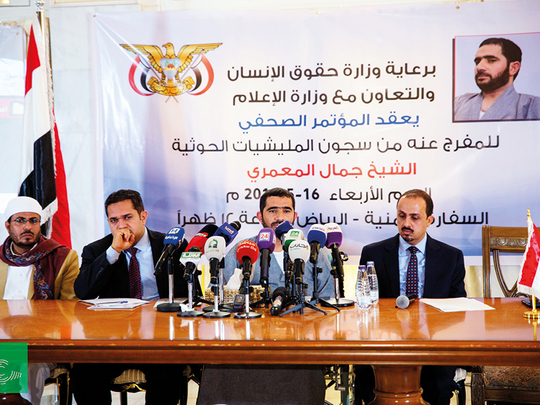
Riyadh: Yemen’s Minister of Information, Moammar Al Eryani, and Minister of Human Rights, Dr. Mohammad Askar, have offered the Iranian-backed Houthi militia a prisoner exchange deal on the occasion of the holy month of Ramadan.
The two Ministers also called for the International Committee of the Red Cross and Red Crescent to serve as an intermediary between the two parties.
“The Yemeni government is ready to release all Houthi prisoners if Houthis agree to release all the kidnapped, arrested Yemenis and other foreign captives,” Askar said in the Saudi capital Riyadh.
Al Eryani said President Abd Rabbo Mansour Hadi has directed the government to agree to the exchange of all prisoners in return for the release of all prisoners and abductees in the prisons of the Iran-backed Houthi militia.
“We know of 14 journalists who are being held captive by the Houthis, but there are many more cases that are not reported because the families are afraid to provide information about kidnappings for fear the brutality of the Houthis,” he said.
“We have issued repeated calls for the United Nations and international NGOs to help us negotiate their release. On the occasion of Ramadan, we renew this call.”
The ministers were speaking on the sidelines of a press conference at Yemen’s embassy in Riyadh, attended by foreign diplomats and media representatives.
Yemeni journalist and political activist Jamal Al Maamari, released on April 1 from Houthi prison as part of a prisoner swap with the legitimate Yemeni government, testified at the conference.
“After I was arrested, they beat me until they thought I was dead, and threw me to the morgue. I was lucky to have survived. They were surprised that I did not die and brought me back to the torture rooms. Then they kept me awake for eight days — with sessions of torture taking place every 15 minutes,” Al Maamari said, the Centre for International Communication (CIC) reported.
Three years of torture at the hands of the Houthis in unofficial prison facilities left Al Maamari paralysed.
The extensive torture programme in Houthi prisons did not only target Yemenis but foreigners as well, including a couple of western UN contractors who were Maamari’s cellmates. One of them, John Hamen, was beaten to death in custody, he said.
“An American, John, was beaten to death and I am the only eyewitness. There was another Georgian killed. There are more westerners, but I cannot disclose identities because I am concerned about their safety. I urge France and other western countries to protect their citizens.”
Al Maamari said Hamen was allegedly tortured and killed by Hamdi Ali Sofiyan, Houthi militia’s security officer; and Attalah Ali Khatira, who also goes by his nom de guerre Abu Mohammad Razehi, the director of the prison where Al Maamari and others were held.
Al Maamari blamed Iran and its Houthi proxy for the torture.
“They are the ones who are training and supplying the Houthis. Iranians used to be everywhere in Sana’a — 28 direct flights from Tehran on a weekly basis had been bringing missiles, moles, torturers and interrogators.”
He named his captors as Mehdi Mohammad Jarfan, Jassem Jarfan and Ali Hussain Al Marrani, claiming that they were related to the Houthi security department. He also said that two Iranian Revolutionary Guard Corps officers were involved in his torture. He mentioned their names as Fahrament Ridai and Arish Tosi Al Shirazi.
Al Maamari and many other former detainees are currently receiving treatment in Saudi Arabia as part of the Yemen Comprehensive Humanitarian Operations programme.












